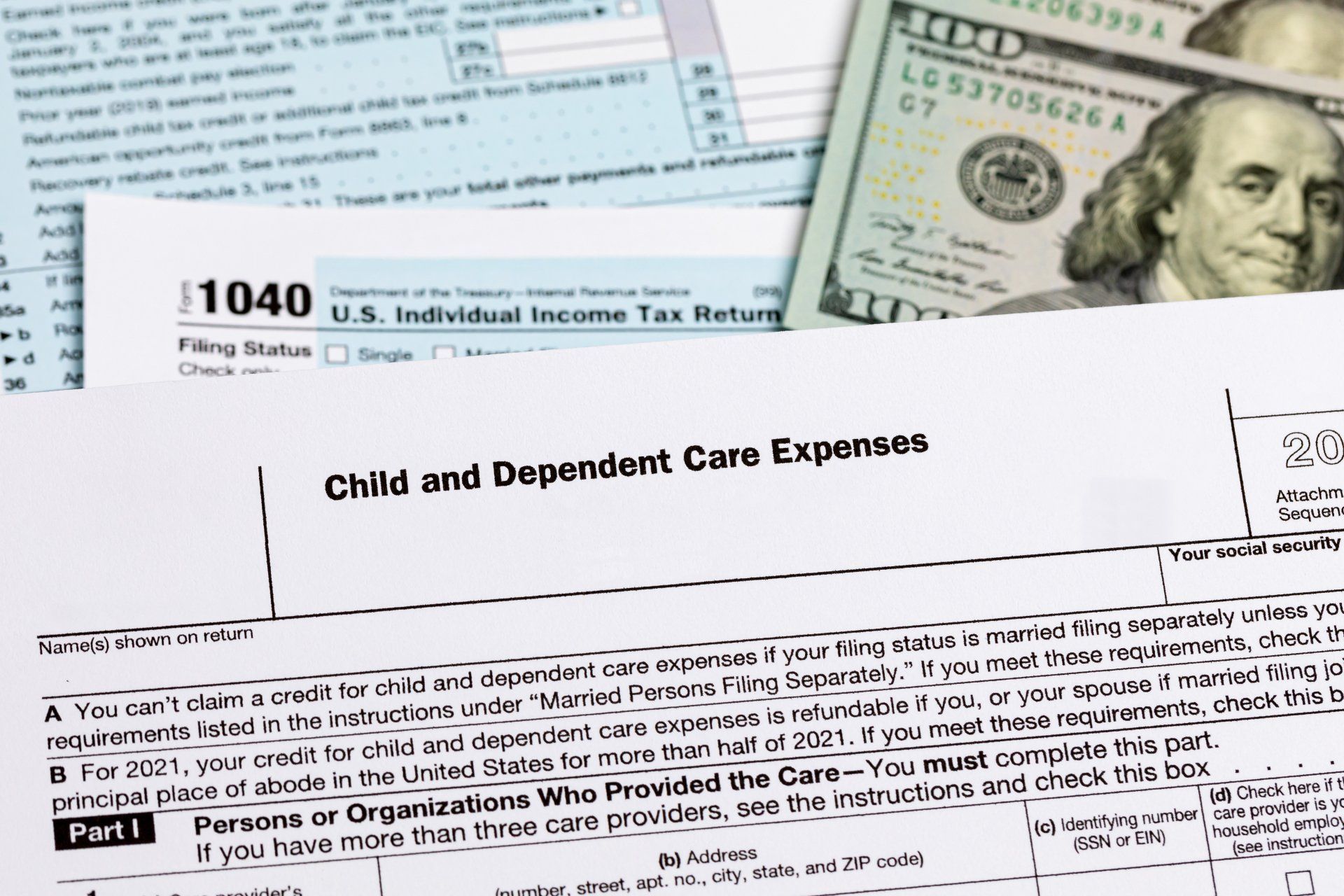Attorneys at Law
Blog Layout
Did you know that many people with disabilities qualify for the Earned Income Tax Credit; yet up to 1.5 million fail to claim this valuable benefit
Brian Bailey • Jan 23, 2017
The Internal Revenue Service wants taxpayers with disabilities and parents of children with disabilities to be aware of the Earned Income Tax Credit (EITC) and correctly claim it if they qualify.
The EITC is a federal income tax credit for workers who don’t earn a high income ($53,505 or less for 2016) and meet other eligibility requirements. Because it’s a refundable credit, those who qualify and claim the credit could pay less federal tax, pay no tax or even get a tax refund.
The EITC could put an extra $2 or up to $6,269 into a taxpayer’s pocket. Nevertheless, the IRS estimates that as many as 1.5 million people with disabilities miss out on this valuable credit because they fail to file a tax return. Many of these non-filers fall below the income threshold requiring them to file. Even so, the IRS urges them to consider filing anyway because the only way to receive this credit is to file a return and claim EITC.
To qualify for EITC, the taxpayer must have earned income. Usually, this means income either from a job or from self-employment. But taxpayers who retired on disability can also count as earned income any taxable benefits they receive under an employer’s disability retirement plan. These benefits remain earned income until the disability retiree reaches minimum retirement age. The IRS emphasized that social Security benefits or Social Security Disability Income (SSDI) do not count as earned income.
Additionally, taxpayers may claim a child with a disability or a relative with a disability of any age to get the credit if the person meets all other EITC requirements. Use the EITC Assistant, on IRS.gov, to determine eligibility, estimate the amount of credit and more.
People with disabilities are often concerned that a tax refund will impact their eligibility for one or more public benefits, including Social Security disability benefits, Medicaid, and Food Stamps. The law is clear that tax refunds, including refunds from tax credits such as the EITC, are not counted as income for purposes of determining eligibility for benefits. This applies to any federal program and any state or local program financed with federal funds.
The best way to get the EITC is to file electronically: through a qualified tax professional; using free community tax help sites; or through IRS Free File.
Many EITC filers will receive their refunds later this year than in past years. That’s because a new law requires the IRS to hold refunds
claiming the EITC and the Additional Child Tax Credit (ACTC) until mid-February. The IRS cautions taxpayers that these refunds likely will not start arriving in bank accounts or on debit cards until the week of Feb. 27. Taxpayers claiming the EITC or ACTC should file as soon as they have all of the necessary documentation together to prepare an accurate return. In other words, file as they normally would.
The IRS and partners nationwide will hold the annual EITC Awareness Day on Friday, Jan. 27, 2017 to alert millions of workers who may be missing out on this significant tax credit and other refundable credits. One easy way to support this outreach effort is by participating on the IRS Thunderclap
to help promote #EITCAwarenessDay through social media. For more information on EITC and other refundable credits, visit the EITC
page on IRS.gov. or contact us at 859-236-8888
*reprinted from IRS bulletin IR-2017-17 (January 23, 2017)

By Brian D. Bailey
•
15 Jul, 2022
https://www.youtube.com/watch?v=86DwHBCoLp0#t=207m27s If the link doesn't automatically take to to the video . Please cut & Paste to you browser Hey everyone out there now you can see us during our appearances on the Joe Show. Click on the link here to see why my momma always said I had a face made for radio. And for my law school peeps listen close for a painful law school memory when we discuss the "Absence of Malice"

By Brian D. Bailey Esq.
•
28 Jun, 2022
Parents who are divorced, separated, never married or live apart and who share custody of a child with an ex-spouse or ex-partner need to understand the specific rules about who may be eligible to claim the child for tax purposes. This can make filing taxes easier for both parents and avoid errors that may lead to processing delays or costly tax mistakes. Only one person may be eligible to claim the qualifying child as a dependent. Only one person can claim the tax benefits related to a dependent child who meets the qualifying child rules. Parents can’t share or split up the tax benefits for their child on their respective tax returns. It’s important that each parent understands who will claim their child on their tax return. If two people claim the same child on different tax returns, it will slow down processing time while the IRS determines which parent’s claim takes priority. Custodial parents generally claim the qualifying child as a dependent on their return. The custodial parent is the parent with whom the child lived for the greater number of nights during the year. The other parent is the noncustodial parent. In most cases, because of the residency test, the custodial parent claims the child on their tax return. If the child lived with each parent for an equal number of nights during the year, the custodial parent is the parent with the higher adjusted gross income. Tie-breaker rules may apply if the child is a qualifying child of more than one person. Although the child may meet the conditions to be a qualifying child of either parent, only one person can actually claim the child as a qualifying child, provided the taxpayer is eligible. People should carefully read Publication 504, Divorced or Separated Individuals to understand who is eligible to claim a qualifying child. Noncustodial parents may be eligible to claim a qualifying child. Special rules apply for a child to be treated as a qualifying child of the noncustodial parent. The custodial parent can release the dependency exemption and sign a written declaration or Form 8332, Release/Revocation of Release of Claim to Exemption for Child by Custodial Parent for the noncustodial parent to submit with their tax return. This also applies to some tax benefits, including the child tax credit, additional child tax credit, and credit for other dependents. It doesn’t apply to other tax benefits, such as the earned income credit, dependent care credit or head of household filing status. For More information: Check out IRS Publication 501, Dependents, Standard Deduction, and Filing Information Whom May I Claim as a Dependent? If you have questions or need help navigating which parent gets to claim the children for tax purposes. Feel free to Give us a call at 859-236-8888.

By Brian D. Bailey Esq.
•
17 Jun, 2022
It is with mixed emotions that we announce our very own justin Johnson has decided to take a position working as Assistant Commonwealth attorney for the 50th Judicial Circuit. We are sad to see him go but are comforted with the fact that we know he will bring his integrity and brilliance to this next chapter of his life and that maybe in some small way we contributed to that. Also we are proud to know that he will in a very real way be carrying on the tradition of this firm's founder Hon. George M McClure III by serving this area while ensuring both the victims and accused receive justice and fair play.

By Brian D. Bailey Esq.
•
31 May, 2022
Both Patrick & Myself come from a long line of men and women who have bravely & honorably served this country. Both of our fathers George M McClure III & John L Bailey. Our Grandfather’s Dr. George M McClure Jr., Clarence E. Bailey and Claude L. Stacey. As well as many of our aunts, uncles and cousins have all bravely and honorably served this country some of them came home to take there place in society never really discussing their service nor asking for any special treatment because of it. Some came home in a box. draped in a flag, having paid the ultimate sacrifice. I never had the honor of serving myself. I had intended to serve. I even made the trip from Rockford Illinois to Great Lakes Naval base to take the ASFAB which I actually did very well on. However the day before I was going to sign my enlistment papers my father sat me down and said these words to me that forever changed the course of my life. He said “Son our family has done its fair share for King & Country go to college” I took my dad’s advice and I have honestly had a life that is greater than I could have ever imagined. But I have always felt a little guilty that I didn’t serve like most of the men in my family chose to do. Memorial Day is always bitter sweet for me, because I realize that I am in a very personal way the recipient of the sacrifices made by Generations of my family that served sacrificed and died so that I wouldn’t have too. I know I’m not the only one who has benefited from that type of sacrifice I know many of you out there reading this have stories that are very similar to mine. So tomorrow while we are all enjoying our hot dogs, hamburgers and mom’s apple pie let’s all take a moment to remember the ones that sacrificed so that we wouldn’t have too. Have a Happy and Thankful Memorial Day. ---- Brian
This Is An Advertisement
Area of Service
Boyle, Mercer, Lincoln, Garrard, Casey, Marion, Rockcastle, Washington, Anderson, and Jessamine Counties
Business Hours:
- Mon - Fri
- -
- Sat - Sun
- Closed
Content, including images, displayed on this website is protected by copyright laws. Downloading, republication, retransmission or reproduction of content on this website is strictly prohibited. Terms of Use
| Privacy Policy











